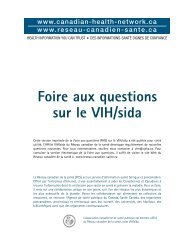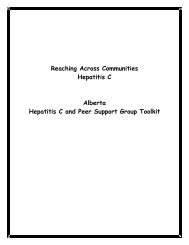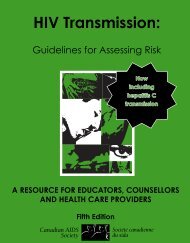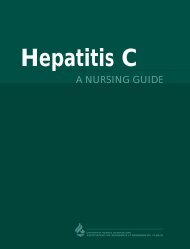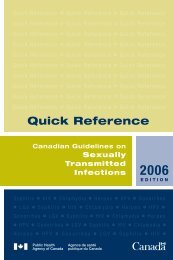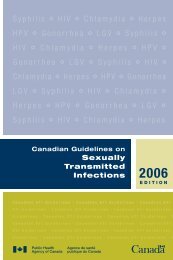A Guide to Primary Care of People with HIV/AIDS - Canadian Public ...
A Guide to Primary Care of People with HIV/AIDS - Canadian Public ...
A Guide to Primary Care of People with HIV/AIDS - Canadian Public ...
You also want an ePaper? Increase the reach of your titles
YUMPU automatically turns print PDFs into web optimized ePapers that Google loves.
A <strong>Guide</strong> <strong>to</strong> <strong>Primary</strong> <strong>Care</strong> <strong>of</strong> <strong>People</strong> <strong>with</strong> <strong>HIV</strong>/<strong>AIDS</strong><br />
Chapter 16: Clinic Management<br />
medications: how many prescription refills are provided<br />
at a time, how new refills are provided, access <strong>to</strong><br />
controlled drug prescriptions or refills outside <strong>of</strong><br />
normal clinic hours, and refills <strong>of</strong> lost medication or lost<br />
prescriptions. To avoid confusion or disagreement some<br />
clinics have patients sign copies <strong>of</strong> the clinic policy<br />
regarding use <strong>of</strong> controlled medications before they<br />
are given prescriptions. It may be necessary <strong>to</strong> provide<br />
formal notification <strong>to</strong> a substance abuse program or<br />
parole <strong>of</strong>ficer that the clinic is prescribing a controlled<br />
medication, specifying the drug, dose, and duration <strong>of</strong><br />
treatment.<br />
Table 16-3. Clinic Staff Responsibilities<br />
Tasks prior <strong>to</strong> a clinic visit<br />
• Remind every patient <strong>of</strong> appointments via phone call or<br />
postcard<br />
• Review charts <strong>to</strong> list items <strong>to</strong> address during the visit<br />
Tasks during a clinic visit<br />
• Verify patient’s current contact information and current<br />
insurance status<br />
• Orient new patients<br />
• Assist <strong>with</strong> insurance gaps (teaching about need for<br />
referrals, help <strong>with</strong> insurance application or ADAP, etc)<br />
• Assess other barriers <strong>to</strong> care and psychosocial needs<br />
• Assess medication adherence<br />
• Teach and provide behavior change counseling about<br />
medications and self-care<br />
• Assess ongoing transmission behaviors<br />
• Teach and provide behavior change counseling about<br />
transmission behaviors<br />
• Educate about clinical trial opportunities (if applicable)<br />
• Make referrals for psychosocial services<br />
• Make referrals/appointments for medical, dental, mental<br />
health care<br />
Tasks following clinic sessions<br />
• Make followup calls regarding new medication regimens or<br />
referrals<br />
• Call or mail postcards <strong>to</strong> patients who miss their visits<br />
• Help patients overcome barriers <strong>to</strong> clinic attendance<br />
• Extract data and enter it in<strong>to</strong> the information system (not<br />
necessary <strong>with</strong> electronic medical records)<br />
SUPPORT SERVICES AND<br />
LINKAGES NEEDED FOR<br />
<strong>HIV</strong> CARE<br />
How do support services enhance the clinical<br />
care <strong>of</strong> persons <strong>with</strong> <strong>HIV</strong>?<br />
It is a rare clinic that has the funding, personnel, and<br />
expertise <strong>to</strong> address all <strong>of</strong> its patients’ psychosocial<br />
issues. Most patients need services from an array <strong>of</strong><br />
agencies. Case managers assist patients in accessing<br />
the range <strong>of</strong> services and entitlements that can help<br />
them succeed in treatment. This includes assistance<br />
in applying for insurance; accessing support groups;<br />
accessing supplemental food, housing, homemaker<br />
and other concrete services; accessing mental health<br />
and substance abuse services. Case managers should<br />
perform periodic assessments <strong>of</strong> clients’ needs and<br />
update comprehensive care plans every 6 months. Home<br />
visits can be very useful as part <strong>of</strong> the assessment. Some<br />
case managers or their agencies will provide selected<br />
direct services themselves; these may include short-term<br />
counseling, transportation for clinic visits, accompanying<br />
patients <strong>to</strong> clinic visits, and providing financial assistance<br />
for specific emergencies. Excellent case managers help<br />
motivate patients.<br />
Close coordination between clinic staff and case<br />
management is important <strong>to</strong> avoid duplication <strong>of</strong><br />
effort and services. Periodic case conferences between<br />
clinic staff and case managers are ideal. Written<br />
communication, for example sharing case management<br />
care plans, can be useful. Case management agencies and<br />
clinical sites need <strong>to</strong> obtain written consent from patients<br />
<strong>to</strong> share the information that allows coordination.<br />
How do clinics create useful linkages <strong>with</strong><br />
community-based services?<br />
Clinics can develop relationships <strong>with</strong> community-based<br />
case managers or directly <strong>with</strong> providers <strong>of</strong> specific<br />
services, such as metal health, substance abuse, or<br />
housing. Personal contact between clinic and agency<br />
is important <strong>to</strong> establish the relationship, and ongoing<br />
contacts are necessary for coordination. Community<br />
organizations are <strong>of</strong>ten pleased <strong>to</strong> give in-service<br />
education <strong>to</strong> clinic staff in order <strong>to</strong> streamline the<br />
referral process. Clinics should make their expectations<br />
clear <strong>to</strong> community-based agencies. Clinics can function<br />
as advocates <strong>to</strong> ensure that their patients receive the<br />
attention and services for which they were referred.<br />
Periodic interdisciplinary meetings <strong>of</strong> clinic staff <strong>with</strong><br />
representatives <strong>of</strong> community-based agencies, including<br />
case managers, are very useful.<br />
16<br />
U.S. Department <strong>of</strong> Health and Human Services, Health Resources and Services Administration, <strong>HIV</strong>/<strong>AIDS</strong> Bureau<br />
137



